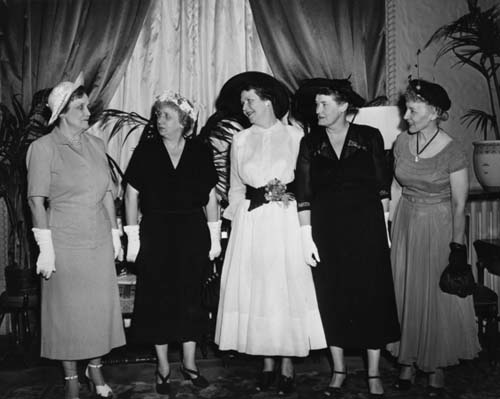19 Mar. 1892–21 Sept. 1984

Gladys Love Avery Tillett, political leader and proponent of equal rights for women, was born in Morganton. Her parents were Judge A. C. Avery of the North Carolina Supreme Court and his wife, Sarah Love Thomas. Her paternal great-grandfather, Waightstill Avery, was the first attorney general of the state. On her mother's side her great-grandfather was William Holland Thomas, white chief of the Cherokee Indians. She graduated from the North Carolina College for Women in 1915, where she was influenced by Professor Harriet Elliott, and received a second bachelor's degree from The University of North Carolina in 1917 with a major in political science. She became interested in the issue of women's rights, and while her husband was serving in the army during World War I, she continued her studies at Columbia University; in New York she also engaged in social work.
Her interest in politics never wavered throughout her life. From 1920 until her death, she cast her ballot for every Democratic presidential nominee. While her husband, an important Charlotte lawyer and onetime president of the state bar, pursued his professional career with an occasional foray into support of some public cause, Gladys Tillett pursued a career in politics.
In Charlotte she was active with the YWCA and the Business and Professional Women's Club and also performed with the Charlotte Little Theater. Beginning in the 1930s Mrs. Tillett held numerous positions in the Democratic party and in 1936 was director of the Speakers Bureau of the Women's Division of the Democratic National Committee—a post she held again in 1940. This required her to find thousands of speakers for different women's groups nationwide.
In 1943 she became the first woman to be named assistant to the chairman of the Democratic National Convention. The next year she became the first woman to address the convention, and she returned to address it again in 1948. Her work as an observer at the 1945 founding conference of the United Nations in San Francisco helped her when she worked with UNESCO in 1949.
These national activities kept her in the spotlight and busy, but she did make time for other activities. She served on the State Board of Elections and organized the first county League of Women Voters in North Carolina. From 1961 to 1966 she was a delegate to the United Nations Commission on the Status of Women, and in the 1970s she was active in support of the Equal Rights Amendment. She once remarked to a reporter: "It's my highest ambition to be free and equal. I may have missed it by a few years, but I want it to end that way." She found sincere satisfaction in politics. "Women in the South are very interested in politics and very active," she once observed. "This is all nonsense about the Southern woman devoting herself exclusively to home activities."
Mrs. Tillett was awarded LL.D. degrees from the Woman's College in Greensboro and The University of North Carolina and the L.H.D. degree from Queens College. In 1917 she married Charles Walter Tillett, Jr., of Charlotte, and they had three children: Charles W. III, Gladys, and Sara. A Presbyterian, she was buried in Elmwood Cemetery, Charlotte.